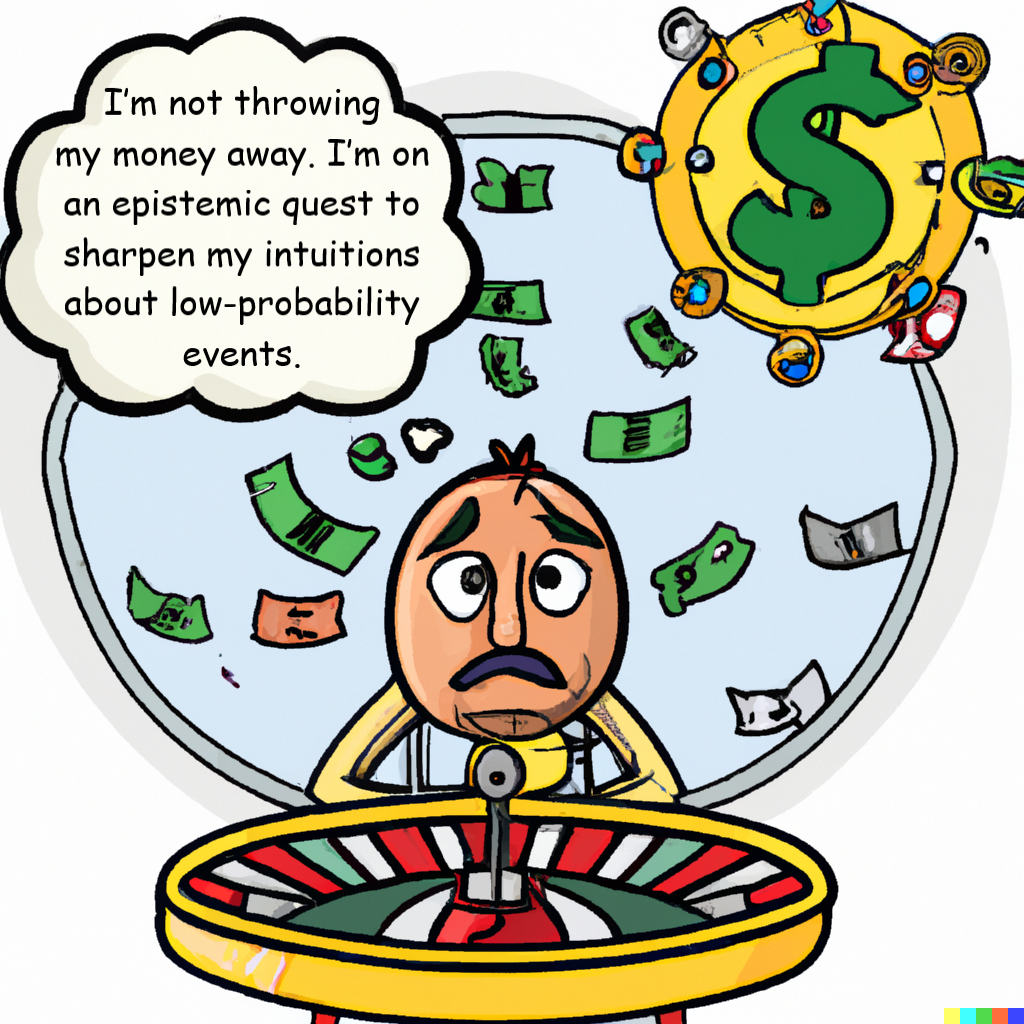Pascal's roulette wheel, or how I won $20
I was at a casino last week. I was down on my luck, having lost $20 at the 7-card poker table.
Then I remembered when my friend Jesse had told me about the Martingale system which guarantees you to win at roulette! It goes like this:
First bet $20 on red. If red comes up, you’ve won. Quit
If you lose, double your bet to $40 and put it on red. If red comes up, you lost $20 the first round, but then won $40 the second round, so in total you won $20. Quit
If you lose again, double your bet to $80…
…and so on. Just keep betting red, doubling your bet each time, and eventually you are bound to win, taking home $20
This was clearly the only way to climb my way out of this $20 hole I was in. Given the table limit, the only way I could lose was if I lost roulette 5 games in a row (1). The odds of this were 4% - practically zero!! (2)
So I cashed in with $100 worth of chips and put $20 on red. I lost the first bet, but then bet again at $40 and won. I had won back at roulette the $20 I had lost at poker!
Jesse was a genius! I was half considering simply quitting my job and moving into a mattress in the corner of this casino to make my way as a roulette player.
Before making any final decision on my career and housing, I decided to crunch some numbers and calculate the expected value of carrying out the Martingale strategy into infinity.
As I should have expected given that casinos remain in business, the house still wins in the long run even if you use a Martingale strategy. This wasn’t a viable career option for me
The thing I hadn’t really considered was that if I lost 5 games in a row, I would have been losing around $600. Even with only a 4% chance of losing that much, this potential loss outweighs the 96% chance that I win $20 (3).
In my mind, 4% rounded down to “basically zero”. But in real life, things with 4% probability happen about 1 in every 25 times. In finance / probability, these are known as “tail risks”. And this tail risk had a disproportionally large consequence - losing more than $600.
—
DALL-E’s interpretation of Blaise Pascal playing roulette with God in a Chinatown casino
Even if there was no table limit and I could play the game infinite times, I still would be expected to lose. This was super hard for me to intuitively understand. The odds that red loses 20 times in a row are 0.0002%. If I had enough money to double my bets 20 times, that feels like that’s basically a guaranteed win, right?
No. What feels like a “guaranteed” win is actually only a 99.9998% chance. This is a small tail risk but with a huge consequence - if I did lose 20 games in a row, I would be losing $20M (4). Which, despite my lucrative recent side hustles in forex and casinos, is more money than I have.
I was falling victim to failures in thinking about tail risks that Nassim Nicholas Taleb describes in The Black Swan: “just as we tend to underestimate the role of luck in life in general, we tend to overestimate it in games of chance.”
Also created with DALL-E
This is the first time I’ve been confronted with tail risks in a way that feels salient. I think having played roulette will help me when thinking about things like existential risks, risky but high-impact ventures, and the existence of aliens.
So now I have a good excuse to keep going to the casino. I’m not throwing my money away. I’m on an epistemic quest to sharpen my intuitions about low-probability events.
It also makes me think of Blaise Pascal, who I think would have happily taken my money as I played roulette over and over again, delighting in the small chance of winning huge amounts from me.
—
Thanks to Binx for co-writing this post!
—
1. the table had a maximum bet of $500, so if I lost at $20, $40, $80, $160, and $320, I would not be able to double my bet again to $640
2. it was a single-zero roulette table, so the odds of winning on red were 18/37. Odds of losing 5 in a row were (19/37)^5 = 3.6%
3. Expected value: $20 * 0.96 - $630 * .04 = expected loss of -$6
4. $20 * 2^19 = $10M lost on the last bet, then another $10M for all I lost cumulatively on the previous bets

